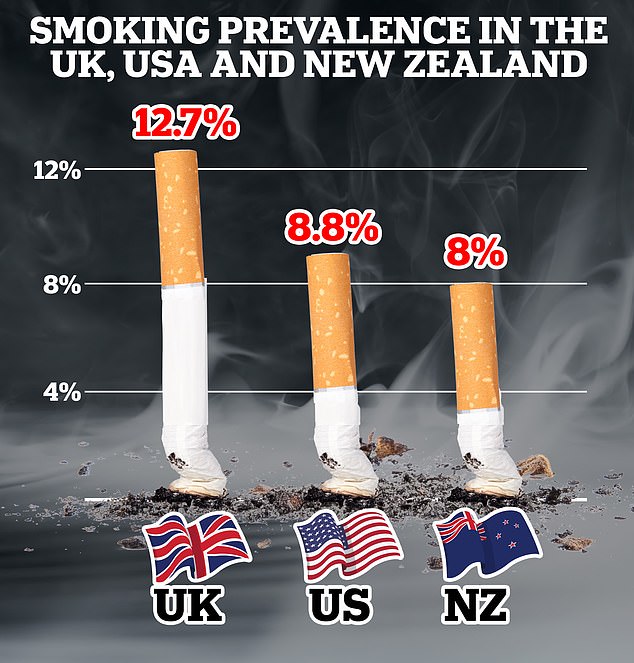The growing number of smoking-related cancer cases is due to medical advances, population growth and the legacy of widespread cigarette addiction, experts say.
New research shows the number of people diagnosed with cancer caused by smoking has reached an all-time high, with 160 new cases per day.
However, despite a 17 percent increase in cases since 2003, the number of smokers has plummeted over the past 20 years.
Dr Rob Hynds, a lung cancer researcher at University College London, believes there are several factors behind the shocking data, not least that even those who kicked the habit two decades ago are still at higher risk of developing cancer.
He said: ‘The proportion of people dying from lung cancer is falling as would be expected based on the reduction in smoking.
Tobacco is known to cause 16 different types of cancer, with lung cancer alone causing 33,000 cases a year.

Despite falling smoking rates, the number of smoking-related cancer cases continues to rise because former smokers continue to be diagnosed.
‘But now our understanding of cancer is much better than before, and that has allowed us to attribute more cancers and types of cancer to smoking.
‘For example, last year it was revealed that several annual cases of breast cancer were caused by smoking and were included in the statistics for the first time.’
He said population growth has limited the apparent decline in smoking rates.
Although the proportion of people who smoke has fallen from 45 per cent in 1975 to 13 per cent today, the UK population has grown by more than 10 million in that period.
And medical advances, including early detection and life-prolonging treatment, have contributed to the rise in cases.
“We are now much better at detecting cancer,” said Dr Hynds. “Lung cancer screening has started to be rolled out in England and increased public awareness of cancer means it is being detected much earlier.”
‘In addition to finding more cases, they are being detected earlier, so patients have a better chance of survival.’
Dr Hynds said former smokers continue to be at higher risk of being diagnosed with cancer for years after quitting.

The Organisation for Economic Co-operation and Development’s 2023 health report showed that 12.7 per cent of Britons aged 15 and over smoke cigarettes daily, a figure much higher than in the United States and New Zealand.
“We know that the time lag between the mutations that initiate lung cancer and diagnosis can, in some cases, be up to 20 years or more,” he said.
‘Older people who started smoking at a young age continue to enter the system at the same rate as before.
‘It is younger people, who have never started smoking, who have driven the decline in smoking at the population level. Thus, older people who started smoking at an early age and who have smoked for a long time are still being diagnosed with cancer.
“We are already seeing a significant benefit in lung cancer mortality associated with quitting smoking. In the long term, we might expect the current decline in smoking to be reflected in a decline in cancer cases.”
The research was carried out by Cancer Research UK, which is calling on the Government to reintroduce the Tobacco and E-Cigarettes Bill.
The new anti-smoking law, first proposed by the Conservative government, would have banned anyone born after January 1, 2009 from buying tobacco products, thereby creating a completely smoke-free generation.
The Labour Party has promised to introduce similar legislation in its manifesto and is expected to announce it in the King’s Speech on 17 July.
Dr Katrina Brown, a statistician at Cancer Research UK, said the fact that ex-smokers are diagnosed with cancer later in life is partly responsible for the rise in cases.
She told Mail Online: ‘Smoking prevalence has declined and we hope it will continue to decline, but current smoking-related cancer cases are a legacy of smoking rates from decades past.
‘While we have seen smoking rates declining, they have not done so steadily over time: there have been periods of stabilisation and even slight increases.
“That’s what’s causing the cancer cases we see today, because smoking takes a while to cause cancer.”
He added that population growth means that while the proportion of people who smoke has fallen, the actual number is still quite high.
“As people live longer, there are more people in the population and therefore more people are likely to get cancer,” he said.
‘The total number of people alive today who smoke or have smoked in the past is possibly higher than ever before because population numbers are larger.
‘When someone stops smoking, it takes about 20 years for their cancer risk to return to the level of someone who never smoked.
“Quitting smoking is still, without a doubt, the best thing you can do for your health, but to some extent, the damage has already been done.”
The researchers considered deaths from 16 different forms of cancer that have been linked to smoking.
Because cancer-causing toxins from tobacco and nicotine travel through the body via the blood, they can cause a wide range of cancers.
Dr. Brown noted that while smoking rates have declined, people continue to pick up the habit.
She said: ‘We know that socioeconomic deprivation is associated with higher smoking prevalence.
‘Men are more likely to smoke than women, and young people who are exposed to tobacco at home are more likely to start smoking.
“The reasons why people do it are really complex, but it’s still bad for everyone.”
Professor Sir Richard Peto, from Oxford University, said that while smoking-related cancer cases appeared to be increasing, the number of deaths had been falling over the past two decades.
“Mortality matters more than incidence, and national mortality trends can be estimated more reliably than incidence trends,” he said.
‘For both men and women, tobacco-attributable cancer death rates and tobacco-attributable overall death rates have been declining since 2000.’


